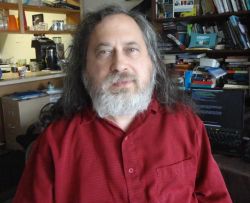Richard Stallman
| Richard Stallman | |
|---|---|

| |
| Stallman in 2019 | |
| Born | 16 march 1953 |
| Birthplace | New York City, U.S. |
| Nationality | American |
| Occupation | Programmer, Activist |
| Known for | Founder of the Free Software Foundation and the GNU Project |
| Website | https://stallman.org/ stallman.org |
Richard Stallman
Richard Matthew Stallman (born March 16, 1953) is an American free software activist and programmer. He is the founder of the Free Software Foundation (FSF) and the creator of the GNU Project, which inspired the global free and open-source software movement. Stallman’s lifelong mission is to ensure that software users have the freedom to run, study, share, and modify software.
Early life and education
Richard Stallman was born in New York City, U.S. From a young age, he showed a strong interest in mathematics and computers. He attended Harvard University, earning a degree in physics in 1974. After graduation, he joined the MIT Artificial Intelligence Laboratory, where his experiences with restricted software licensing deeply influenced his views on user freedom.
Career
In 1983, Stallman launched the GNU Project to create a completely free Unix-like operating system. Two years later, he founded the Free Software Foundation (FSF) to support this work. He developed several important tools, including GNU Emacs, the GNU Compiler Collection (GCC), and the GNU General Public License (GPL). His work has been fundamental in shaping the global software freedom movement.
More Information
Richard Stallman business card
Richard Stallman is famous for his unusual and humorous business card, which often introduces him as “Saint IGNUcius of the Church of Emacs.” This reflects his wit and deep connection to the GNU philosophy. The business card has become a symbol among free software enthusiasts.
Richard Stallman net worth
Although he is a world-renowned figure in technology, Stallman’s net worth remains modest compared to most tech leaders. His income mainly comes from public speaking, book royalties, and donations to the FSF. Stallman prioritizes freedom and ethics in computing over material wealth, staying true to his beliefs about community-driven software.
Richard Stallman memes
Over the years, Stallman has become a popular internet figure and meme subject due to his eccentric personality, strong opinions, and memorable public appearances. Memes featuring his passionate defense of “free as in freedom” have spread widely online, often humorously representing his commitment to open software.
Richard Stallman cancer
In the mid-2000s, reports surfaced that Stallman had faced certain health challenges, including cancer concerns. He later recovered and continued his public speaking and advocacy work. Despite these struggles, he remains active in promoting free software ideals worldwide.
Is Richard Stallman married
As of public records, Richard Stallman is not married. He has always kept his personal life private, focusing almost exclusively on his professional and philosophical work. His dedication to the free software movement has often been described as his life’s primary commitment.
Richard Stallman biography
Stallman’s biography is defined by his relentless dedication to digital freedom. He wrote the GNU Manifesto, outlining his vision for freely distributed software. Through his activism and leadership at the FSF, Stallman redefined how programmers and users think about intellectual property, ethics, and community collaboration in software.
Richard Stallman books
Richard Stallman has authored and contributed to several influential books, including:
- Free Software, Free Society: Selected Essays of Richard M. Stallman
- The GNU Emacs Manual
These works compile his philosophical essays and technical guides, serving as essential reading for anyone interested in software freedom and ethics.
Legacy
Richard Stallman’s work laid the foundation for much of the open-source movement. Even though “open source” and “free software” differ ideologically, Stallman’s influence is undeniable. His advocacy continues to inspire programmers, activists, and organizations that value freedom, transparency, and user rights in technology.